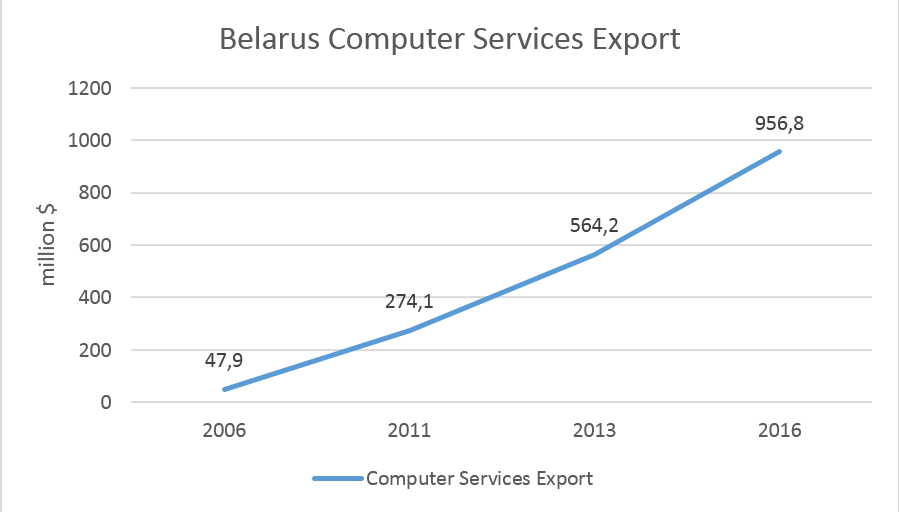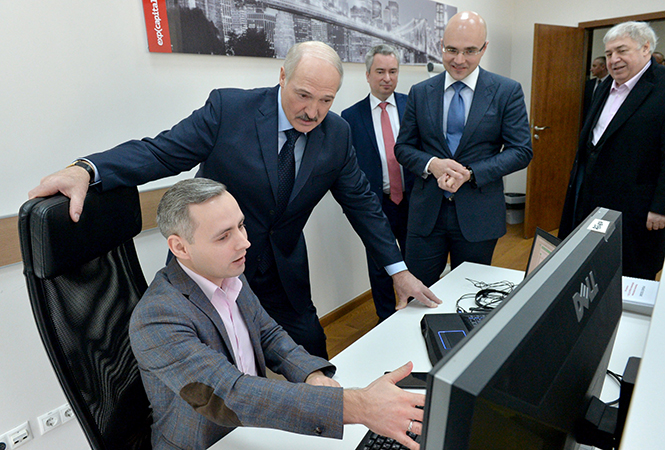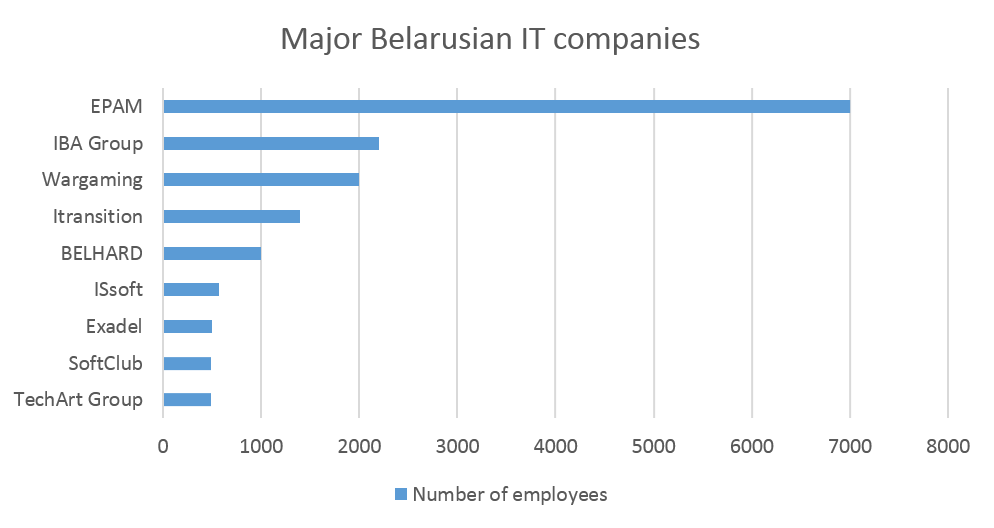Is the IT sector Belarus’s most successful industry?

Usievalad Jančeŭski and Pierre-Dimitri Gore-Coty. Photo: Belta
On 24 May, Usievalad Jančeŭski, the Head of Belarus’s High Technologies Park (HTP), and Pierre-Dimitri Gore-Coty, Head of the EMEA region at Uber, agreed to an R&D centre for Uber in HTP for driverless vehicles.
Uber’s decision to cooperate with HTP does not come as a surprise, given Belarus’s reputation on the East European IT market. Belarus hosts more than 1,000 IT companies with over 30,000 employees. Boasting many well-educated and relatively inexpensive specialists, the country provides excellent hi-tech outsourcing services for foreign enterprises.
The majority of IT clients come from North America and Europe, while a number of famous IT firms, such as EPAM Systems and IBA Group, have roots in Belarus. The IT industry was successful thanks to limited government interference and a large pool of highly-skilled professionals.
Despite the favourable business climate, however, the unstable tax system, loosely defined property rights, the government’s capricious behaviour, and Western sanctions are barriers to the Belarusian IT business.
The history of tech innovation in Belarus
During Soviet times, Belarus was an epicentre of technological research and development: Belarusian engineers designed 60 per cent of the USSR’s computers. Once the Soviet Union fell apart, Belarus’s legacy of software expertise and scientific research became the foundation for today’s independent IT entrepreneurial activity. Young programmers kept their small companies away from state control; in some cases they eventually entered the global market.
In 2005, after Lukashenka signed a presidential decree entitled ‘On the High Tech Park’, Belarus got its own version of Silicon Valley. The establishment of the High Tech Park has done much to foster the development of information and communication technologies (ICT) in Belarus, producing computer services for export. With simplified regulations regarding hi-tech business and taxation, Belarus became one of Europe’s main outsourcing destinations, competing with other East European countries.
 Given the overall economic decline, the authorities see the IT industry as a potential solution to the Belarusian economy’s woes, leading them to promote Belarus’s self-branding as an ‘IT country’. Meanwhile, foreign clients choose Belarus because it’s IT services are high-quality and cost-efficient. Although Belarusian developers charge more than South-East Asian ones, they still demand less in wages than West Europeans and Americans; they are thus among the cheapest IT specialists in Eastern Europe. Foreign enterprises make Belarus’s IT market grow, currently contributing 1.5 per cent to the GDP; this number is expected to rise to 4-5 per cent by 2020.
Given the overall economic decline, the authorities see the IT industry as a potential solution to the Belarusian economy’s woes, leading them to promote Belarus’s self-branding as an ‘IT country’. Meanwhile, foreign clients choose Belarus because it’s IT services are high-quality and cost-efficient. Although Belarusian developers charge more than South-East Asian ones, they still demand less in wages than West Europeans and Americans; they are thus among the cheapest IT specialists in Eastern Europe. Foreign enterprises make Belarus’s IT market grow, currently contributing 1.5 per cent to the GDP; this number is expected to rise to 4-5 per cent by 2020.
During Lukashenka’s visit to HTP in March 2017, the president asserted that the state would continue to assist the IT sphere in legal and other aspects. Besides state investments, the ICT sector is growing mainly thanks to limited governmental control and relaxed taxation. The 2005 presidential decree exempted High Tech Park companies from corporate and profit tax payments, and HTP residents from custom duties. Additionally, HTP residents receive special rent and insurance rates, pay a fixed 9 per cent income tax instead of the usual 13 per cent, and receive the benefits of the Social Security Fund despite earning above average salaries (BYN 777 or $420 in April 2017).
Nevertheless, the IT industry remains vulnerable to the whims of the authorities. For instance, in March 2017, Lukashenka dismissed Valiery Capkala, HTP’s former head, with no explanation. One version suggests that Capkala did not aim at deploying the IT sector fully in favour of the Belarusian economy. If such incidents occur more often, they may negatively affect the IT investment climate, creating uncertainty among potential investors.
Young and well-educated IT talents
IT-sector growth became possible thanks to the huge IT talent pool. Despite the many issues in the Belarusian education system, it maintains a focus on mathematics, hard sciences, and logical thinking. Around 16,000 STEM students graduate from 54 universities every year, 4,000 of which are IT specialists. Because the IT sector guarantees a well-paid job, admissions for IT degrees are highly competitive. For example, the admissions rate for the Information Systems and Technologies degree at Belarusian State University of Informatics and Radio-electronics (BSUIR) reached 7.3 people per place in 2016; 373 out of 400 applicants had a passing score.
 Therefore, most Belarusian IT students have deep knowledge of their subject and participate in numerous national Olympiads and international competitions. For example, Belarusian sport programmer Hienadź Karatkievič won the Google Code Jam competition three times in a row in 2014-2016, breaking the world record. What’s more, Belarusian students won several prizes in the IEEEXtreme competition, International Mathematics Competition, and Informatics Olympiad. Such results demonstrate the high level of technical and scientific knowledge that allows Belarusian programmers to compete with their rivals from Western countries.
Therefore, most Belarusian IT students have deep knowledge of their subject and participate in numerous national Olympiads and international competitions. For example, Belarusian sport programmer Hienadź Karatkievič won the Google Code Jam competition three times in a row in 2014-2016, breaking the world record. What’s more, Belarusian students won several prizes in the IEEEXtreme competition, International Mathematics Competition, and Informatics Olympiad. Such results demonstrate the high level of technical and scientific knowledge that allows Belarusian programmers to compete with their rivals from Western countries.
It comes as no surprise that many IT firms maintain close contacts with Belarusian universities, providing special trainings for students, taking on interns, and hiring recent graduates. These graduates constitute 11 per cent of IT employees, while one third have a 7-year working experience. Thus, with an average age of 28.6, young people dominate the Belarusian IT industry and enjoy a standard of living several times higher than the national average.
Local product development, geography and mentality
Localised product development also contributes to Belarus’s self-branding as an IT country. Recently, the mobility company Gett acquired the Belarusian start-up Juno, while document management startup PandaDoc scored $15 million of investment. Other examples of famous Belarusian IT projects include MSQRD, one of the top 2016 iPhone apps, popular messaging service Viber, the video game World of Tanks, and the mapping service Maps.me.
 In some cases, Belarusian emigrants contribute to IT growth by bringing leading software enterprises back to their home country. This was the case for Arkadź Dobkin, who opened multiple franchises of his company EPAM Systems and began collaborations with local universities to train and recruit students. EPAM, together with IBA Group and Wargaming, are perennially at the top of the list of Belarusian IT companies.
In some cases, Belarusian emigrants contribute to IT growth by bringing leading software enterprises back to their home country. This was the case for Arkadź Dobkin, who opened multiple franchises of his company EPAM Systems and began collaborations with local universities to train and recruit students. EPAM, together with IBA Group and Wargaming, are perennially at the top of the list of Belarusian IT companies.
Finally, the geographic location of Belarus makes it attractive to IT companies, which prefer physical proximity to outsourced personnel. What’s more, Belarusians are more familiar with the Western mind-set, and have no trouble adapting to company etiquette. Belarusian IT specialists have earned a reputation for being hard-working, tech-savvy, mobile, and eager to be relocated if necessary.
Whether the Belarusian IT industry will keep growing depends primarily on the demand for Belarusian software services and custom development from international clients. Unless the government puts more pressure on the IT sector, Belarus will probably see more foreign tech enterprises coming.
Nevertheless, these companies still opt for registration abroad to avoid economic vulnerability and political risks. This demonstrates a lack of confidence in Belarus’s business environment, which may lose its attractiveness once HTP’s privileges come to an end in 2020.
This article is a part of a series of publications on IT sector in Belarus supported by VP Capital.




 Moreover, alcohol prices tend to decrease right before elections or during economic crises. Cheap alcohol in Belarus has become a tool to neutralise activism and numb national consciousness. By decreasing alcohol prices, authorities guarantee themselves more loyalty and support.
Moreover, alcohol prices tend to decrease right before elections or during economic crises. Cheap alcohol in Belarus has become a tool to neutralise activism and numb national consciousness. By decreasing alcohol prices, authorities guarantee themselves more loyalty and support. On Polish radio, Igar Gubarevich discusses the
On Polish radio, Igar Gubarevich discusses the 